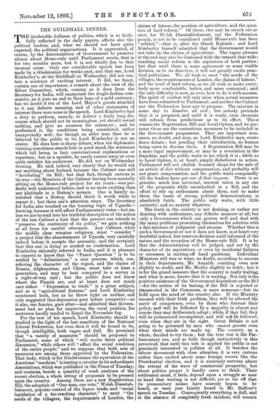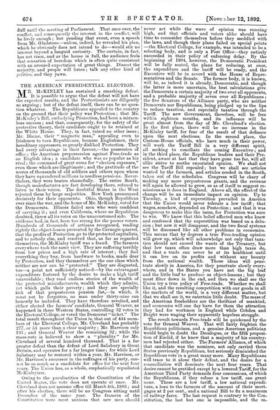THE GITILDHALL DINNER. T HE intolerable dullness of politics, which is
so faith- fully reflected in the daily papers, affects also the political leaders, and, what we should not have quite expected, the political organisations. It is aggravated, of course, by the determination of Government to preserve silence about Home-rule until Parliament meets, that is for two months more, but it is not wholly due to that unusual cause. Only one considerable speech has been made by a Gladstonian for weeks past, and that one, Lord Kimberley's, at the Guildhall on Wednesday, did not con- tain a sentence of exciting interest. It did, we fancy, contain one of importance, a remark about the view of the Silver Committee, which, coming as it does from the Secretary for India, will exasperate the Anglo-Indian com- munity, as it puts an end to their hope of a gold currency ; but we doubt if ten of the Lord Mayor's guests attached to it any definite meaning, and of other statements of interest there were none in the speech. Lord Kimberley had a duty to perform, namely, to deliver a fairly long dis- course which should not be meaningless, yet should reveal nothing, and give no occasion for comment ; and be performed it, the conditions being considered, rather unexpectedly well ; for though an abler man than he is believed by the public to be, Lord Kimberley is not an orator. He does best in sharp debate, when his diplomatic training sometimes stands him in good stead, the sentences which tell being, in fact, conversational explanations or repartees ; but as a. speaker, he rarely carries away or even quite satisfies his audiences. He did not on Wednesday evening. He said, indeed, very clearly that he would not say anything about Ireland, because the Cabinet was still " incubating" its Bill ; but that fact, though curious in its way—the Members of the Cabinet having been mentally sitting on the Home-rule project for six years—was per- fectly well understood before, and is no more exciting than any platitude in a Bishop's sermon. One is faintly in- terested that a Bishop should think it worth while to repeat it ; but there one's attention stops. The Secretary for India also touched on the burning topic of Uganda— burning, because it will affect Parliamentary votes—but un- less we are to read into his truthful description of the action of the late Cabinet a hint that the present one intends to "preserve the continuity of its policy," we gain nothing at all from his careful utterance. Any Cabinet, while the middle class remains -religious, must " consider " a project like the abandonment of Uganda very carefully indeed before-sit accepts the necessity, and the certainty that this oneis doing so needed no confirmation. Lord Kimberley naturally referred to India, and it is pleasant to experts to know that the ‘f-Pamir Question" is to be settled by "delimitation," a nice 'process, which, con- sidering the character .of. the% region; and the claims of Russia, Afghanistan, and China, Must take at least a generation, and may be best.. compared to a survey in a right-of-way suit ; but the public. does not -know. where the Pamir s are, and at heart , does not • midi: care either. "Depression in trade" is a. great subject, and so is "agricultural distress,"- and • LOrd Kimberley mentioned both, but as he threw light on neither, and only suggested that depression goes before prosperity—as it also, one fancies, goes 'after—and admitted that Govern- ment had no plan for improving the rural• position, his sentences hardly tended to dispel the November fog. • For the rest •of his speech, Lord Kimberley should be studied in the light of the last manifesto of the National Liberal Federation, but. even then it wills be found to be, though intelligible, both vague and dill. He promised that "a variety of measures" should be proposed td Parliament, some of which "will excite fierCe political discussion," while others will !..‘ affect the social condition of the entire people," and we, suppose that both sets of measures are among. those approved by the Federation. That body, which is for Gladstonians theequivalent of the American "machine," is issuinga circular to its subordinate Associations, which was published in the Times of Tuesday, and contains, beside a quantity.of : weak :analyses of the recent election, a whole string of proptaials to be pressed upon the country. Among _them -axe a new Registration Bill, the adoption of "One man, one vote;". Welsh Disestab- lishment, popular control of the liquor trade, and "social legislation of- a far-reaching character," to -.meet ." the needs of the villagers, the requirements of Lcindon, the claims of labour, the position of agriculture, and the ques- tion of land reform." Of these, two may be struck out at once, for Welsh Disestablishment, say the Federation people, is not to be considered until Home-rule has been "settled,"—that is, after the Greek Kalends ; and Lord Kimberley himself admitted that the Government would not take up the claims of agriculture. The vague phrases at the end may also be dismissed with the remark that wide- reaching social reform is the aspiration of both parties ; but that until there is some agreement or some visible division as to its direction, it will not greatly excite prac- tical politicians. We all wish to meet "the needs of the villages, the requirements of London, the claims of labour,' and the need of land reform, as we all wish to make every- body more comfortable, better, and more contented ; and the only difficulty is now, as ever, how to do it with success. The spirit of combat will only arise when actual measures have been submitted to Parliament, and neither the Cabinet nor the Federation have any to propose. The mixture is some day to dissolve all evil ; but nobody pretends that it is prepared, and until it is ready, even chemists will refrain from predictions as to its effect. Thei e remain the Registration Bill and Local Option, and we pre- sume these are the contentious measures to be included in the Government programme. They are important mea- sures, no doubt, and may, as Lord Kimberley says, create fierce debate ; but pending their introduction, no human' being cares to discuss them. A Registration Bill may be a mere legal improvement, or may be a revolution in the franchise, and the public waits to see which it is ; while as to Local Option, it, at heart, simply disbelieves in action. Parliament will not abolish licensed shops for the sale of ' an article of diet without compensation, and probably will not grant compensation, and the public waits composedly till the leaders have got out of that impasse. There is no genuine, much less universal, interest taken in any one of the proposals while unembodied in a Bill, and the effort to stir up enthusiasm about them, and to make' them the bases of strong political demonstrations, is absolutely futile. The public only waits, with little curiosity, and no anxiety whatever.
The truth is, the country is not desiring, or rather not desiring with enthusiasm, any definite measure at all, but only a Government which can govern well and deal with the many problems presenting themselves for solution with a, fair measure of judgment and success. Whether this is such a Government or not it does not know, is at heart very doubtful indeed, but reserves decision until informed of the nature and the reception of the Home-rule Bill. It is by that the Administration will be judged, and not by the character of its aspirations, or even by incidental failures or successes in staving-off hard questions. Individual Ministers will wax or wane, no doubt, according to success in their departments, Mr. Asquith counting even now slightly to credit, and Mr. Morley slightly to debit; but it is for the grand measure that the country is really waiting, and what is more, knows that it is waiting. Not only is the positive existence of the Government dependent on the Bill —s-for the notion of its lasting, if the Bill is rejected or thinsmuted in the Commons, is mere nonsense—but its hold upon the mind of the country also. If the Ministry succeed with their Irish problem, they will be allowed the merit -of competence, even by those who distrust their ,anct'vvill be followed by a Majority in almost any course they may deliberately adopt ; While, if they fail, they will be pronounced incompetent, and will n6t.4 followed, even when they ate in the right. Great Britain is not going to be governed by men who cannot govern even when their minds are made up. The country, as a whole,' decided to try them ; but the true test is the Par- liamentary one, and so fully though instinctively is this perceived, that until this teat is applied the public is not genuinely interested in politics at all. It watches the labour movement with close attention, it is very curious rather than excited about some foreign events like the Presidential election, and it is anxiously nervous about ' the retreat of the wave of commercial prosperity, but' about politics proper it hardly cares to think. Their settlement must, it feels, depend upon a struggle so near at hand that waiting is not difficult, yet so far off that its premonitory noises have scarcely begun to be , heard, or were just faintly heard in Mr. Balfour's speech on Tuesday. COneequently everything is dull, and in the absence of completely fresh incident, will remain dull until the meeting of Parliament. That once over, the conflict, and consequently the interest in the conflict, will be lively enough ; but pending that event, even a speech from Mr. Gladstone—unless, indeed, he revealed his plan, which he obviously does not intend to do—would stir no interest beyond a languid curiosity. The curtain, in fact, has not risen, and as the house is full, the audience feels that sensation of boredom which is often quite consistent with an aroused expectation of great things. Dissect the majority, and people will listen ; talk any other kind of politics, and they yawn.







































 Previous page
Previous page